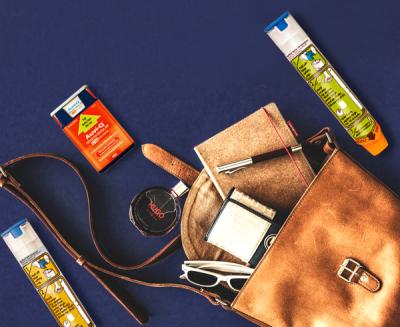
How to Store EpiPens or Auvi-Q?
Share

EpiPen® and Auvi Q® is a very important lifeline, mostly to people who have life-threatening and severe food allergies or anaphylaxis. For parents or loved ones, it’s crucial to always have an EpiPen handy and ready to use in case of emergencies.
To give a brief idea about EpiPen and Auvi Q (Epinephrine Auto-Injector), “it is an injectable indicated in the emergency treatment of allergic reactions (Type I) including anaphylaxis to insect stings (e.g., order Hymenoptera, which include bees, wasps, hornets, yellow jackets and fire ants) and biting insects (e.g., triatoma, mosquitoes), allergen immunotherapy, foods, drugs, diagnostic testing substances (e.g., radiocontrast media) and other allergens, as well as idiopathic anaphylaxis or exercise-induced anaphylaxis.”
Most severe allergic reactions happen very fast so it is important to have it handy and at its best condition. To ensure its effectiveness, it’s is critical that we know how to store our EpiPen® or Auvi- Q® properly.
Recommended Storage of EpiPen® and Auvi-Q®
The suggested storage and temperature range for both EpiPen and Auvi Q are 25°C (77°F); EXCURSIONS PERMITTED TO 15° – 30°C (59 ° – 86°F).
Suggestion: do not refrigerate, protect from light, and periodically check to make sure the solution in the auto-injector is not brown in color.
Both EpiPen and Auvi Q are light sensitive and should be kept in the outer case provided to protect it, as shown on their package inserts or on its boxes.
However many people ask, “What if it was stored outside its recommended temperature range?” : What if it was left in a car on a hot sunny day or in a below-freezing temperature?” “Is it still safe for use and stable?” “Should we replace our auto-injectors?”
Studies and Experiments

In an article from American Academy of Asthma and Immunology, according to Phil Lieberman, M.D, there’s not enough literature about the stability of epinephrine in an automatic epinephrine injector exposed to temperatures outside the recommended range. Though it is very common for patients to store their auto-injectors outside its recommended temperature, he only suggests replacing auto-injectors if it’s frozen and requires re-thawing.
On the same article, Dr. Lieberman included a study from his colleague Dr. Simons about the long-term stability of EpiPens and Auvi Q under Annals of Allergy, Asthma & Immunology
(Volume 102, Issue 6, June 2009, Pages 500–503). Dr. Simons put 40 unsealed autoinjectors, containing 0.3 mg of epinephrine under conditions of high ambient temperature, low vs high humidity, and light vs dark and store them at 38° C for 5 months. He removes duplicate syringes per month to analyze the epinephrine content.
The results are epinephrine dosage went down by 90% to 115% in 3 months after storage at 38°C and low humidity and by 4 months after storage at 38°C and high humidity. Dr. Simons also state that light has no significant effect on the auto-injectors.
When to Replace Epinephrine Auto-Injectors

Manufacturers of autoinjectors suggest replacing if it is discolored or contains a precipitate and if the solution is cloudy or contains particles. It should be clear and colorless.
On the other note, Dr. Simon’s study recommends replacing our auto-injectors every after a few months on a regular basis, especially in places with hot climates.
In conclusion, it won’t hurt if we will be cautious and religiously follow what the manufacturer’s recommendation on their package inserts and boxes about storing our epinephrine auto-injectors. It is our first lifeline against anaphylaxis and we should be more careful about storing it and be mindful in monitoring its condition for best results. We can take the extra step and invest in a high-quality carrying case to help prolong its shelf life and make it a lot easier for us to have it at arms reach without compromising its content.
PracMedic Bags® Medicine Case and Medical Bag
This is what we had in mind when we created our collection of Medicine Cases and Medical Bag. We put a lot of thought into the design of every PracMedic Bags to ensure they are Pragmatic. We hope you could hold as much allergy medicine and paraphernalia as possible in one lightweight and portable Med Case or Med Bag. In addition, PracMedic Bags uses only Premium Quality materials to produce the bags as we want to ensure reliability and durability for such an important item. For a peace of mind, all PracMedic Bags’s medicine case and bags are insulated with 5mm PE Foam, as it helps to protect the meds from external elements, especially with heat sensitive medicine like EpiPens and Auvi-Q. The Medicine Cases are sealed with sturdy and durable YKK® Zippers to ensure you have quick and easy access to your Allergy Medicine when needed most.
Instructions – We have included a free bi-fold card on How to Give EpiPen / Auvi-Q with your Medicine Case or Medical Bag. So, you can refer to it in an emergency situation. And, Emergency Contact info (ICE) card is also included for you to attach a photo and pen down important medical details. Last but not least, 1 Year Limited Warranty is included with every purchase of PracMedic Bags®.
Disclaimer: EpiPen®, Auvi-Q®, and YKK® did not endorse PracMedic Bags® nor are affiliated to PracMedic Bags®
Sources:
www.dailymed.nlm.nih.gov
https://globenewswire.com/
http://www.scijourner.org
